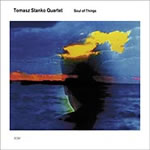|
|
 |
Dusted Reviews
Artist: Tomasz Stanko Quartet Album: Soul of Things Label: ECM Review date: Jun. 19, 2002 |

|
|
|
 |
Throughout his career, trumpeter Tomasz Stanko’s music has continually drawn comparisons to the cinema. His work has, in fact, often been aligned with art film, most notably on his 1997 Litania project, which brought together a group of ECM heavies to record interpretations of the music of Krszysztof Komeda, a longtime collaborator with Stanko as well as one of his major influences. Komeda scored music for over 40 films, including Polish classics by Roman Polanski and Andrzej Wajda, and was also a guiding light in the modern Polish jazz movement. Stanko has also contributed themes to numerous films, including Maldoror’s War Song, which resurfaces on Soul of Things, and a score for Filip Zylber’s A Farewell to Maria. In fact, the first work the current quartet did together was on theatre music for the Polish Govi label.
The texture of the music itself makes a comparison to the cinematic world an apt one. As the opening modal wanderings of “Soul of Things, Variation I” commence, a mental image in black and white is conjured; not the black and white that seems antiseptic and devoid of emotive quality, but rather one that, by its sparseness, makes the play of shadow and light more crisp and meaningful. The music is a study in rich understatement, seething with a latent energy that always threatens to break the album’s somber veneer but rarely does. The album also has an underlying sense of abstract narrative, which makes Soul of Things feel not so much like individual compositions but like one slow-moving solution with frequent melodic and thematic eddies and ripples. This notion is suggested by Stanko’s partially ironic statement “I’ve been playing the same song my whole life.”
Throughout his career, which is now approaching fifty years, Stanko has played with many of the leading avant-gardists, Cecil Taylor, Edward Vesala and Gary Peacock among them. He is also firmly entrenched in the European jazz world, from his work with the Jazz Darings, Poland’s and perhaps Europe’s first “free” jazz group, in the early 60s, through his time in Komeda’s outfit, a quintet with Sbigniew Seifert, and recordings for ECM beginning with 1975’s “Balladyna.” With his current quartet, comprised of pianist Marcin Wasilewski, double-bassist Slawomir Kirkiewicz and Michal Miskiewicz on drums, he has begun nurturing the next generation. For these three, much of what they know about music was learned from listening to Stanko and his cohorts. Remembering the time in the early 90s when he first head this trio, Stanko says “Marcin and Slawoir were about 18, then, and I think Michal was 16, but they had some individuality. They were good from the beginning. I think it is that way with musicians – if there’s some promise there you’re going to hear it immediately.”
There is a cohesiveness to the group that must come not just from being a working group for over eight years, but also from having a shared musical legacy, learning from the same people and experiencing similar events in the same place. In the album’s liner notes, Marcin Kydrynski notes the particularly moving return to native soil that closes the album. He writes: “Never before have I been as moved by his music as while realizing, in the introduction of ‘Soul of Things, Variation XIII,’ that his quest for meaning has returned him to childhood memories. The theme of ‘Hejnal’…is as close to every Pole’s heart as the national anthem. That’s the melody that has been played on trumpets for centuries, each and every hour, from the tower of Cracow’s main church.”
By Bruce Wallace
|







